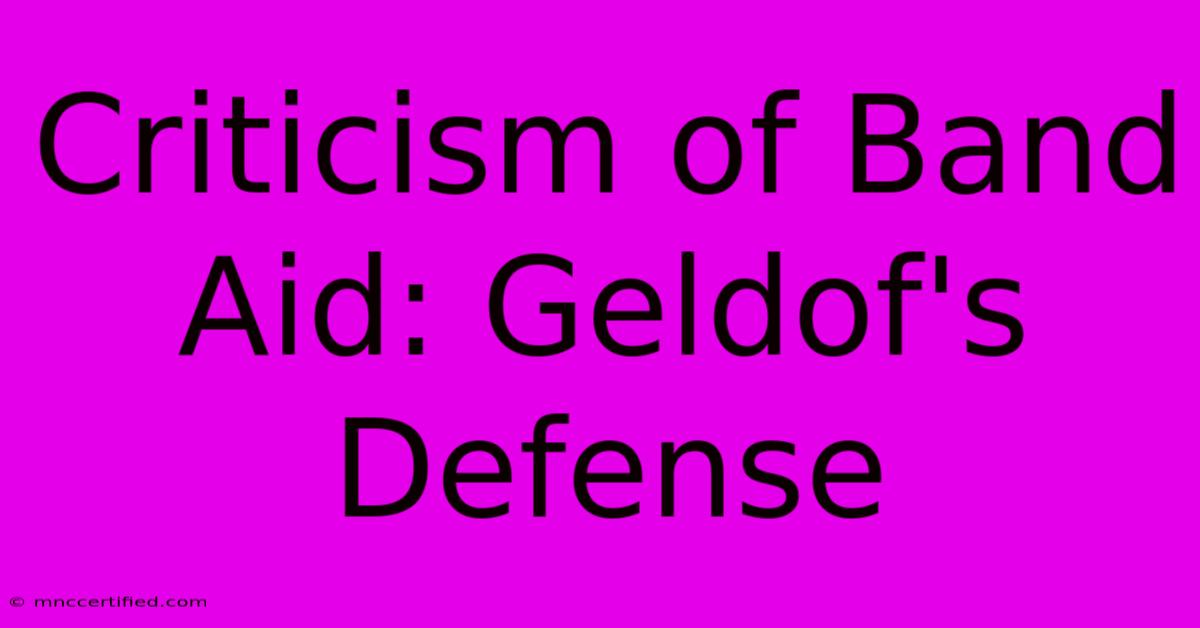Criticism Of Band Aid: Geldof's Defense

Table of Contents
Criticism of Band Aid: Geldof's Defense – A Retrospective
Bob Geldof's Band Aid, conceived in 1984 to combat the Ethiopian famine, remains a potent symbol of charity rock. However, the initiative, while undeniably raising significant funds, also attracted considerable criticism, prompting robust defenses from Geldof himself. This article delves into the key criticisms leveled against Band Aid and explores Geldof's responses, offering a balanced perspective on this complex legacy.
The Major Criticisms of Band Aid
While the immediate impact of Band Aid's "Do They Know It's Christmas?" was undeniably positive, raising millions for famine relief, several criticisms emerged over time:
1. Cultural Appropriation and Paternalism:
One of the most enduring criticisms centers around the song's lyrics and overall approach. Critics argued that the lyrics presented a simplistic and patronizing view of Africa, portraying the continent as a monolithic entity of suffering and lacking agency. The use of a white savior narrative, with Western artists speaking for the African people, fueled accusations of cultural appropriation and neo-colonial paternalism. The lack of African artists in the central recording further exacerbated this criticism.
2. Inefficiency and Mismanagement of Funds:
Concerns arose regarding the efficiency and effectiveness of aid distribution. Questions were raised about the transparency of the funds' allocation and whether the aid actually reached those most in need. While acknowledging challenges in logistics and corruption within the affected regions, some critics questioned whether the money could have been better used through established aid organizations with greater on-the-ground experience.
3. The "Band Aid" Approach to Long-Term Solutions:
Many argued that the Band Aid approach, while successful in raising immediate funds, failed to address the underlying structural issues contributing to famine – issues such as poverty, political instability, and unfair trade practices. Critics claimed that short-term relief efforts, while necessary, masked the need for long-term, sustainable solutions. Geldof's approach was seen by some as a superficial plaster over a deep wound.
Geldof's Defense and Counterarguments
Geldof consistently defended Band Aid, arguing that its primary objective was to raise immediate awareness and funds for a crisis demanding urgent action. He emphasized the sheer volume of money raised, highlighting its impact on saving lives during a critical period.
1. Addressing the Criticism of Cultural Appropriation:
While acknowledging the limitations of the song's depiction of Africa, Geldof maintained that the intention was purely altruistic. He argued that the song’s success in raising awareness and funds justified its approach, even if imperfect. However, this defense has been met with continued debate, with many finding the justification insufficient in light of the ethical concerns.
2. Responding to Concerns about Aid Inefficiency:
Geldof frequently pointed to the significant amount of money raised and the demonstrable positive impact it had on famine relief efforts. While admitting challenges in distribution, he argued that the scale of the operation and the urgency of the situation made imperfections unavoidable. He often emphasized that while some aid might have been mismanaged, the vast majority reached those in need.
3. Justifying the Focus on Immediate Relief:
Geldof staunchly defended the focus on immediate relief, arguing that the priority was saving lives in a situation of acute crisis. He maintained that addressing the long-term structural issues, while crucial, required a separate and equally important approach. He saw Band Aid as a vital, albeit temporary, solution in the face of a devastating humanitarian catastrophe.
Conclusion: A Complex Legacy
The legacy of Band Aid remains complex and multifaceted. While undeniably achieving remarkable fundraising success, the initiative also provoked valid and ongoing criticisms. Geldof’s defense, while passionate and often effective in its time, hasn't fully silenced these criticisms. Examining both sides of this debate allows for a more nuanced understanding of the initiative's impact and the broader ethical considerations of international aid and charitable endeavors. The discussion surrounding Band Aid continues to serve as a valuable case study in the complexities of humanitarian intervention and the challenges of balancing immediate relief with sustainable long-term solutions.

Thank you for visiting our website wich cover about Criticism Of Band Aid: Geldof's Defense. We hope the information provided has been useful to you. Feel free to contact us if you have any questions or need further assistance. See you next time and dont miss to bookmark.
Featured Posts
-
Barbara Taylor Bradfords Inspiring Journey
Nov 26, 2024
-
Al Nassr Ronaldo Asian Champions League Bid
Nov 26, 2024
-
Shots Fired Ladbroke Grove Arrest
Nov 26, 2024
-
Al Nassr Edges Closer Ronaldos Brace
Nov 26, 2024
-
Economy Fire Casualty Insurance
Nov 26, 2024